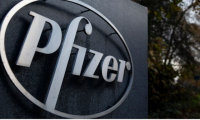-
After FDA rejection, Gilead’s Hepcludex looks set for full EU nod
- Source: drugdu
- 411
- May 8, 2023
-
Biogen chalks up a Tecfidera patent win in Europe after losing US protections
- Source: drugdu
- 140
- May 8, 2023
-
Protalix, Chiesi challenge Sanofi with EU approval for Fabry disease med as FDA decision looms
- Source: drugdu
- 185
- May 8, 2023
-
People with Long COVID neurological symptoms found to have differences in immune cell profiles and autonomic dysfunction
- Source: drugdu
- 159
- May 8, 2023
-
People with Long COVID neurological symptoms found to have differences in immune cell profiles and autonomic dysfunction
- Source: drugdu
- 239
- May 8, 2023
-
A high proportion of adults in Europe do not have protective antibody concentrations against diphtheria
- Source: drugdu
- 153
- May 3, 2023
-
European paediatricians sound alarm over medicine shortage
- Source: drugdu
- 172
- May 2, 2023
-
Pfizer CEO’s texts with European Commission chief trigger new NYT lawsuit
- Source: drugdu
- 141
- May 2, 2023
-
Addressing the much-needed development of effective pneumococcal vaccination policies for long-term care settings
- Source: https://www.news-medical.net/news/20230429/Addressing-the-much-needed-development-of-effective-pneumococcal-vaccination-policies-for-long-term-care-settings.aspx
- 131
- May 1, 2023
-
FDA clears Pfizer’s pneumococcal vaccine for infants and children
- Source: drugdu
- 232
- May 1, 2023
your submission has already been received.
OK
Subscribe
Please enter a valid Email address!
Submit
The most relevant industry news & insight will be sent to you every two weeks.












